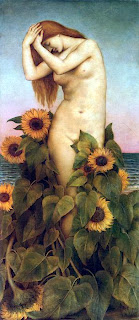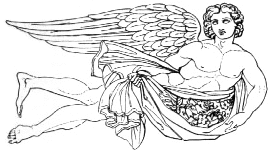 |
| Music contest between Apollo and Pan |
In Greek mythology, Pan, the Greek god of shepherds and nature, was a great musician who is known for his invention of the syrinx, or Greek pan flute. The sound of his pipes was so sweet that he grew proud, and believing himself greater than the chief musician of the gods, Apollo, he challenged Apollo to a musical duel. Apollo consented to the test, for he wished to punish Pan's vanity, while overlooking his own well-known arrogance. Pan and Apollo chose the mountain Tmolus to be the judge of the contest, since no one is so old and wise as the mountain.
 |
| Pan ,Apollo, and Tmolus |
When Pan and Apollo came before Tmolus for the duel, their followers came with them, to hear, and one of those who came with Pan was a mortal named Midas. First Pan played; he blew on his reed pipes, and out came a tune so wild and yet so coaxing that the birds hopped from the trees to get near; the squirrels came running from their holes; and the very trees swayed as if they wanted to dance. The fauns laughed aloud for joy as the melody tickled their furry little ears, and Midas thought it was the sweetest music in the world.
Then Apollo rose, and in his hands he held his golden lyre. When he touched the strings of the lyre, such music stole upon the air as never god nor mortal heard before. The wild creatures of the wood crouched still as stone; the trees kept every leaf from rustling; earth and air were as silent as a dream. When Apollo stopped playing, it was like bidding farewell to one's father and mother.
 |
| Apollo, Tmolus, Pan, and Midas |
When the spell of Apollo's music was broken, the hearers fell at Apollo's feet and proclaimed him the winner. All but Midas, who alone would not admit that the music was better than Pan's. ‘You will have ears to match the mind you have in judging,’ said Apollo, and with these words Apollo caused Midas to have ass's ears.
INDEX







.jpg)






































